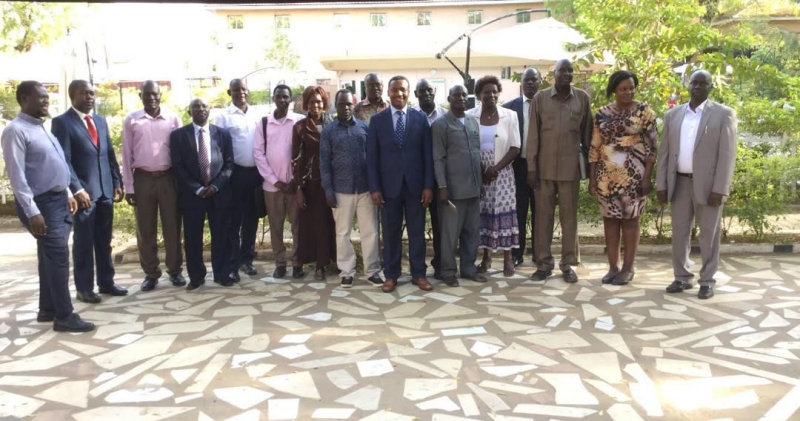The EAC Secretariat staff under the Directorate of Productive Sectors led by Director of Productive Sectors, Jean Baptiste Havugimana, conducted a one-day sensitization mission in Juba, South Sudan.
The EAC Secretariat team comprised of senior staff drawn from the departments of Agriculture and Food Security, Energy, Industry and SMEs Development, Tourism and wildlife management, Environment and Natural Resources management. The event attracted high level policy makers and technical officers drawn from key Ministries in South Sudan.
In his opening remarks, Havugimana noted that the RSS is a valuable and strategic member of the Community in numerous ways. If sustainably exploited, resources in South Sudan could contribute significantly to increased trade and socio-economic development of the Community.
On his part, Leo Okwahi, Director General Ministry of Trade and Industry and East African Affairs, underscored the tremendous potential associated with Productive Sectors in the country. He applauded the EAC Secretariat for organizing the visit and for choosing this very hands-on and customized approach for South Sudan.
He said this kind of visit was much needed in order to try to match actions of EAC productive sectors with the real situations prevailing in those sectors on the ground in S. Sudan. He underscored the fact that the protracted civil war has led to among other many issues; loss of lives, displaced people, stopped all the activities in the productive sectors and other economic and social sectors and undermined the country’s progress since it gained independence eight years ago.
He however, expressed optimism that the peace agreement signed in 2018 was crucial for political stability and socio-economic development of the country.
During the event, EAC Secretariat team made elaborate presentations of key flagship programmes implemented under the Productive Sectors as well as backward and forward linkages across the productive sectors and other socio-economic sectors.
They highlighted in great details achievements and success stories registered so far while indicating where and how they think South Sudan can be immediately involved to achieve quick wins.
Interactive discussions that followed the presentations focused on the benefits that the EAC integration agenda offers and how the Republic of South Sudan can be fully engaged and integrated in the existing programmes, initiatives and projects under productive sectors.
Many observations were made during the meeting by South Sudanese experts and areas prone to quick wins in all the five sectors identified as follows;
Revival of agriculture and livestock sectors basing on the EAC Food and Nutrition Strategy and Action Plan. Agriculture was the main stay of the economy and the country was self-reliant in food and nutrition security until civil strife disrupted the sector. Currently, the country depends largely on imports of all sorts of food from the north Sudan, Uganda and Kenya. In addition, the huge livestock population in the country could be exploited to increase household incomes in areas such as dairy production, meat processing and hides and leather value addition.
South Sudan has vast energy reserves including oil. However, the energy sector is underdeveloped and under exploited. The little available electricity in Juba and other urban areas is produced using costly diesel generators. The EAC power pool and the ongoing interconnections arrangements can benefit RSS to mitigate this challenge. Solar energy can help solve much of this problem especially for urban households.
The country is a potentially lucrative tourist destination but a lot needs to be done in development of tourist facilities and laying down the necessary infrastructure to market tourism. RSS can benefit from EAC single tourist visa arrangements and joint regional marketing interventions led by EAC.
In the area of Industrial development, there is need to pay more attention to promotion of Small Scale Enterprises (SMEs) in order to create more employment opportunities for the youth in agro processing and manufacturing. The country had a number of agro-based industry factories that were running before the war. This could be revitalized to reduce reliance on imports.
Under Environment and Natural Resources Management, the first thing that can be done is the fight against lithering and Pollution. Plastics and all types of other paper waste are everywhere in the City of Juba. A customized awareness and fight against lithering and pollution Programme can be introduced first in the City of Juba and later on scaled up to other cities.
The one-day sensitization mission meeting ended on a high note with South Sudan Sudanese experts committing themselves to escalate the conclusions of the meeting to their principals to ensure that EAC programmes are embraced and mainstreamed in national planning and budgeting cycles of the Republic of South Sudan.
They also committed to prioritize implementation of Summit and Council of Ministers Decisions and Directives in order to contribute towards achievements of the goals of the Community.





